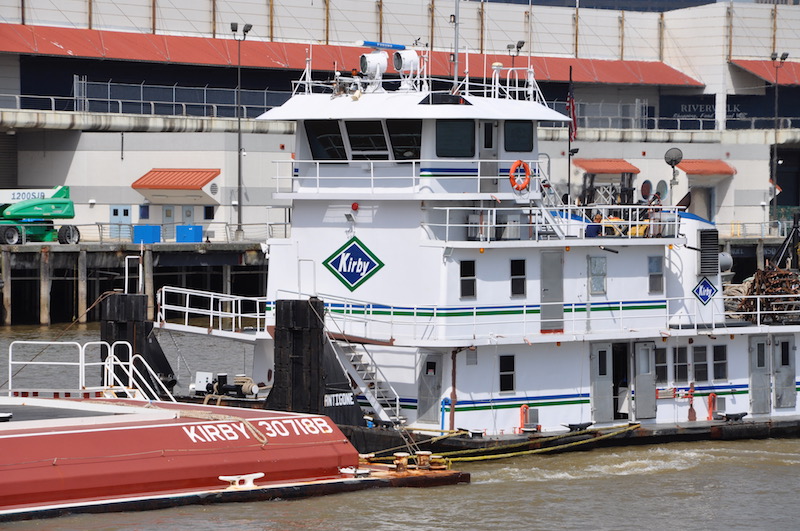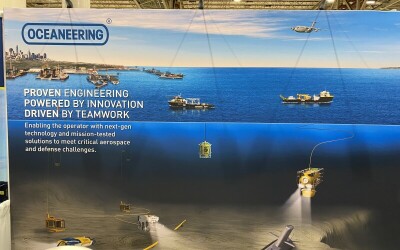Kirby Corp., the nation’s largest inland and coastal tank barge line, has implemented an emergency plan to with deal the coronavirus crisis.
The Houston-based operator says its inland barge business is well-positioned financially to weather economic shocks caused by the pandemic.
Seeking to soothe concerns of investors, CEO and President David Grzebinski said during a webcast on Monday that “Kirby has extensive well-planned and detailed response plans for events such as waterway emergencies, hurricanes and pandemics,” and enacted its pandemic plan a few weeks ago.
He said all non-essential employees are working from home, and none of Kirby’s workforce has tested positive for the virus, although a few are in quarantine as a precaution. “We are actively safeguarding the welfare of our mariners and field employees,” Grzebinski said during the webcast moderated by Jack Atkins of Stephens Inc., an Arkansas-based independent financial services firm. Kirby has some 5,800 employees. “As it stands today, our crisis team meets daily to discuss the issues, and our businesses are operating while retaining our focus on safety and customer service.”
Kirby operates several business lines including distribution and services and marine transportation that includes both inland and offshore barging operations, and Grzebinski turned the discussion to the health of these segments.
He said demand for Kirby tank barges to move bulk liquid cargoes such as petrochemicals, black oil and refined products, remains very strong, with utilization levels in the 95% range in recent weeks, although it has been influenced to some degree by the difficult weather conditions (high water and fog) and lock outages.
“Nonetheless, we are seeing a very strong market. While we do expect to see some reduced demand, particularly for crude and some refined products like jet fuel, it will be from a very tight operating environment.,” the CEO said.
The inland sector is “as busy as I’ve ever seen it. We’re now seeing our customers make sure their supply chains are in good shape. With the ramifications of cutting back plants, barging is a small cost. An economic slowdown can happen and we expect crude barging demand to decline,” but he said a positive for Kirby is that a large number of the contracts for both coastal and inland barging are long term, and they are “pretty strong, with pretty high creditworthy customers.”
He mentioned that construction of the Shell cracker plant along the upper Ohio River has been temporarily halted to comply with coronavirus close-down orders by the state of Pennsylvania, and he expects new plant projects that need construction permits to be delayed until the world economy settles down.
“As we talk to customers, we see them cut back the European refineries and plants first,” Grzebinski said, adding that U.S. plants are more efficient. “If the economy goes into recession, they will cut the volumes, but now we’re not seeing it. We’re as busy as I’ve ever seen it. I hope that it holds until (the disease response) flattens the curve and turns us the other way.”
Grzebinski added that while it’s hard to predict the full impact of the coronavirus and of a possible recession, “we think our marine transportation businesses are well-positioned to weather depressed market conditions. We anticipate that our volumes could decline, but we believe as in past cycles that our marine customer contracts and our variable cost structure will help to minimize the impact on our margins.”
In addition, he noted that Kirby charters a lot of its towboat horsepower, “so we can shed this if demand falls,” which is what the company did in the 2008 recession. “That allowed us to cut a huge amount of cost out of the system.”
In the distribution and services segment, which services diesel engines, transmissions and equipment used in the oilfield, “it goes without saying that this segment will be adversely impacted by the recent significant reduction in oil prices,” he said. “Oil and gas activity has already started to decline, and many of our oilfield customers, and the exploration and production companies they service, are cutting capital expenditure plans for 2020.”
In response to current market conditions in this sector and an expectation that the market won’t soon improve, he said Kirby has made a significant reduction in the workforce in both manufacturing and distribution.
“Our outlook for the oilfield related portion of D&S was very low coming into the year, however, given the current reduction in demand, we have taken and will continue to take the necessary steps to reduce costs in this business.”
Overall, Grzebinski said Kirby will have strong liquidity and significant free cash flow in 2020.
Check out the latest on the coronavirus pandemic and the workboat industry here.





